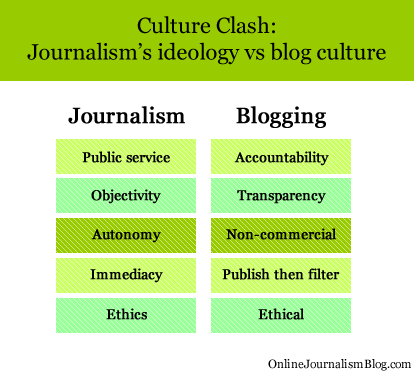I’ve been updating a newsroom policy guide for a project some of my students will be working on, with a particular section on objectivity and impartiality. As this has coincided with the debate on fact-checking stirred by the New York Times public editor Arthur Brisbane, I thought I would reproduce the guidelines here, and invite comments on whether you think it hits the right note:
Objectivity and impartiality: newsroom policy
Objectivity is a method, not an element of style. In other words:
- Do not write stories that give equal weight to each ‘side’ of an argument if the evidence behind each side of the argument is not equal. Doing so misrepresents the balance of opinions or facts. Your obligation is to those facts, not to the different camps whose claims may be false.
- Do not simply report the assertions of different camps. As a journalist your responsibility is to check those assertions. If someone misrepresents the facts, do not simply say someone else disagrees, make a statement along the lines of “However, the actual wording of the report…” or “The official statistics do not support her argument” or “Research into X contradict this.” And of course, link to that evidence and keep a copy for yourself (which is where transparency comes in).
Lazy reporting of assertions without evidence is called the ‘View From Nowhere’ – you can read Jay Rosen’s Q&A or the Wikipedia entry, which includes this useful explanation:
“A journalist who strives for objectivity may fail to exclude popular and/or widespread untrue claims and beliefs from the set of true facts. A journalist who has done this has taken The View From Nowhere. This harms the audience by allowing them to draw conclusions from a set of data that includes untrue possiblities. It can create confusion where none would otherwise exist.”
Impartiality is dependent on objectivity. It is not (as subjects of your stories may argue) giving equal coverage to all sides, but rather promising to tell the story based on objective evidence rather than based on your own bias or prejudice. All journalists will have opinions and preconceived ideas of what a story might be, but an impartial journalist is prepared to change those opinions, and change the angle of the story. In the process they might challenge strongly-held biases of the society they report on – but that’s your job.
The concept of objectivity comes from the sciences, and this provides a useful guideline: scientists don’t sit between two camps and repeat assertions without evaluating them. They identify a claim (hypothesis) and gather the evidence behind it – both primary and secondary.
Claims may, however, already be in the public domain and attracting a lot of attention and support. In those situations reporting should be open about the information the journalist does not have. For example:
- “His office, however, were unable to direct us to the evidence quoted”, or
- “As the report is yet to be published, it is not possible to evaluate the accuracy of these claims”, or
- “When pushed, X could not provide any documentation to back up her claims”.
Thoughts?

